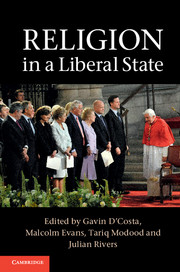Book contents
- Frontmatter
- Contents
- List of contributors
- Acknowledgements
- Introduction
- 1 Religion in a liberal state
- 2 The European Court of Human Rights and religious neutrality
- 3 Religion and sexual orientation: conflict or cohesion?
- 4 Liberal religion and illiberal secularism
- 5 Moderate secularism in liberal societies?
- 6 Excluded, included or foundational?
- 7 Justificatory secularism
- 8 What lacks is feeling: mediating reason and religion today
- 9 Arguing out of bounds: Christian eloquence and the end of Johannine liberalism
- Index
- References
5 - Moderate secularism in liberal societies?
Published online by Cambridge University Press: 05 June 2014
- Frontmatter
- Contents
- List of contributors
- Acknowledgements
- Introduction
- 1 Religion in a liberal state
- 2 The European Court of Human Rights and religious neutrality
- 3 Religion and sexual orientation: conflict or cohesion?
- 4 Liberal religion and illiberal secularism
- 5 Moderate secularism in liberal societies?
- 6 Excluded, included or foundational?
- 7 Justificatory secularism
- 8 What lacks is feeling: mediating reason and religion today
- 9 Arguing out of bounds: Christian eloquence and the end of Johannine liberalism
- Index
- References
Summary
In this chapter I will examine one symptom of what José Casanova describes as the emergence of new historical developments associated with ‘a certain reversal of what appeared to be secular trends’ in that ‘religions across the world are entering the public sphere and the arena of political contestation’ (Casanova, 1994: 6). These developments are taken by some to be evidence of the advent of ‘post-secular societies’ (Habermas, 2006: 46), which is having particular effects in terms of the necessity of fostering the willingness to communicate (Habermas, 2010: 16) between what Habermas calls ‘secular citizens’ and ‘religious citizens’. There are obvious problems associated with the inference (in the prefix ‘post’) that secularization is a linear and homogenous process (Reder, 2010: 38). Reder and Schmidt attempt to downplay ‘the post-secular’ as epochal shift and instead refer to it as a term that (1) acknowledges the continuing social role religions play in societies and (2) has become synonymous with examples of increasing engagement (that is, ‘constructive dialogue’) between faith communities and governments (Reder and Schmidt, 2010: 1). With regard to the latter, Dinham and Lowndes have stated that: ‘academics, policymakers and practitioners are grappling with the emphatic return of faith to the public realm of policy making, and seeking to make sense of its implications’ (Dinham and Lowndes, 2009: 1). This chapter is an example of these ‘grappling’ activities. I will be examining a particular question in this context which is directly linked to questions raised by Raymond Plant’s chapter, namely: to what extent are religious identities and arguments being included in the public political culture? By so doing I will examine two high-profile contributions that attempt to make sense of religious identities and religious arguments in the public realm, and that make recommendations with regards to their place, role and significance.
- Type
- Chapter
- Information
- Religion in a Liberal State , pp. 117 - 134Publisher: Cambridge University PressPrint publication year: 2013



